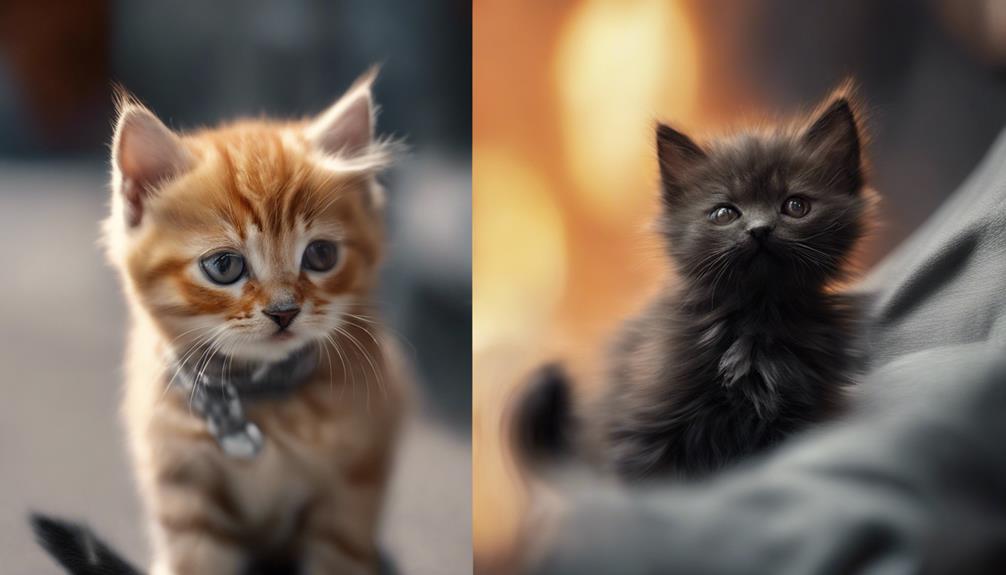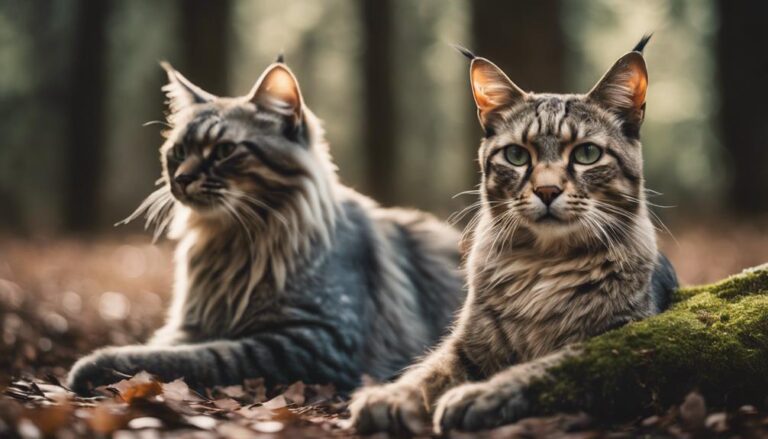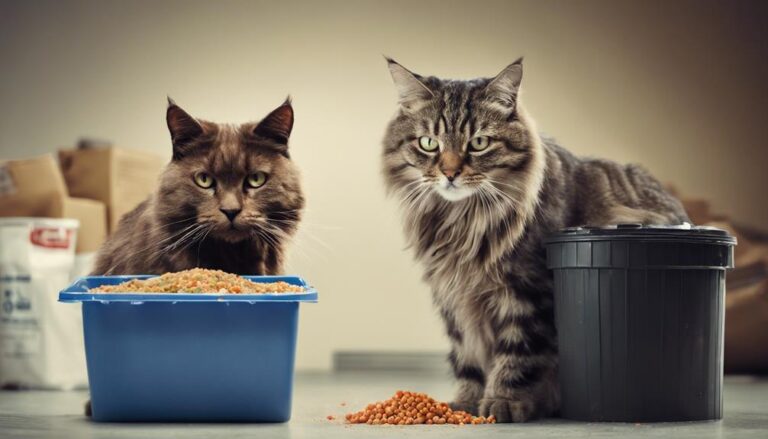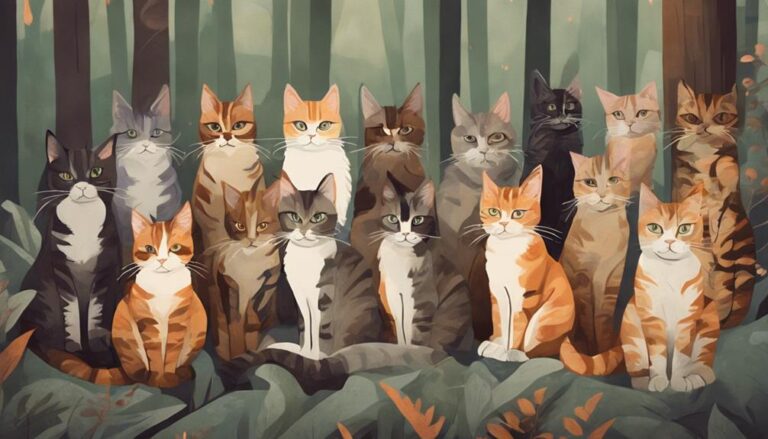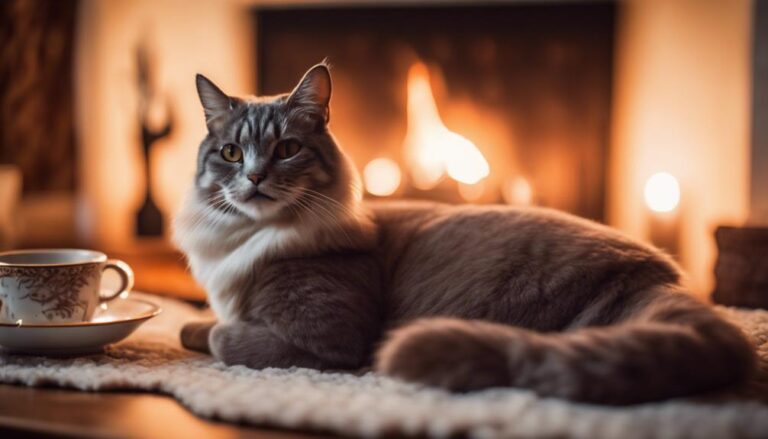As you search for the perfect kitten, you might come across breeders claiming to have rare Black Smoke kittens for sale. But beware – some of these kittens might not be what they seem. Fever Coat kittens, with their warm, golden undertones, are often misidentified and sold as Black Smoke, which has a distinct dark, misty coat with a silver or white undercoat. You're about to invest your heart and money in a new pet, so it's vital to know the difference. But what exactly sets these two coat types apart, and how can you verify you're getting the kitten you really want?
Misidentification of Kitten Coats
You're likely to misidentify a fever coat kitten's true color if you rely solely on their appearance at birth. Newborn fever coat kittens often have a darker, richer coat that can be mistaken for a black smoke. This similarity in appearance can lead to misidentification, which is a common issue faced by breeders and kitten buyers alike. Breeders may unintentionally sell a fever coat kitten as a black smoke, and vice versa. As a result, you may end up with a kitten that doesn't match your expectations. To avoid this, you must verify you're working with reputable breeders who can accurately identify the kitten coats. They will be able to tell you the kitten's true color as it develops over time. Be wary of breeders who are unsure or evasive about a kitten's color, as this could be a sign of misidentification. By doing your research and working with trustworthy breeders, you can certify you get the kitten you want, and avoid the disappointment of misidentification.
Characteristics of Fever Coat
One key characteristic of fever coat kittens is their distinctive, warm, golden undertones that emerge as their coat develops. As you observe these kittens, you'll notice that their fur takes on a subtle, golden sheen, especially in the right light. This is a hallmark of the fever coat pattern, and it's what sets them apart from other coat types. Unfortunately, this unique characteristic is often mistaken for a black smoke coat, leading to misidentification. You might be wondering what makes fever coat kittens so special, and it's their characteristics that truly set them apart. When you're looking for a fever coat kitten, pay attention to the warm, golden tones that emerge as their coat develops. Don't be fooled by breeders who try to pass off black smoke kittens as fever coats – the difference is in the details. By understanding the characteristics of fever coat kittens, you'll be better equipped to identify them and avoid being mistaken about their coat type.
Importance of Color Identification
As you explore the world of fever coat kittens, you'll quickly realize that identifying their colors is vital. You'll need to understand the basics of color identification, including how to recognize specific shades and patterns, to guarantee you're working with healthy, genetically sound kittens. By grasping these fundamentals, you'll be better equipped to make informed breeding decisions and appreciate the unique characteristics of these stunning felines.
Color Identification Basics
Determining a kitten's color is pivotal, since it can greatly impact their overall appearance and even their breeding value. As a buyer, it is imperative to understand the basics of color identification to avoid getting misled, especially when it comes to Fever Coat kittens being sold as Black Smoke.
Color identification can be complex, but here are some key points to keep in mind:
- Genetics play a role: A kitten's color is determined by genetics, and understanding how genes interact is pivotal for accurate identification.
- Coat patterns matter: Coat patterns, such as smoke or tabby, can affect the overall appearance of the kitten's color.
- Shading is important: Shading can greatly impact the appearance of a kitten's color, making it lighter or darker.
- Context is key: Consider the kitten's surroundings and lighting when evaluating their color.
- Expert opinion matters: Consult with breeders or experts who have extensive knowledge of color identification to verify accuracy.
Proper Breeding Practices Matter
You're more likely to get accurate color identification from breeders who prioritize ongoing education and a thorough understanding of color genetics. This is vital in preventing misinformation and scams, like Fever Coat kittens being sold as Black Smoke. Reputable breeders recognize the importance of staying up-to-date with the latest information on color IDs and what their breeding stock can produce. They understand that accurate color identification is a fundamental aspect of responsible breeding practices.
When dealing with breeders, it is vital to verify they're committed to continuous learning and growth. This helps them stay informed about the latest developments in color genetics and prevents the spread of misinformation. Breeders who misidentify colors can damage their reputation and credibility, leading to financial losses for clients. By working with breeders who prioritize proper breeding practices, you can avoid falling victim to scams and guarantee you get the kitten you're paying for. Remember, accurate color identification is a hallmark of a responsible breeder, so don't settle for anything less.
Understanding Color Genetics
One pivotal aspect of responsible breeding practices is grasping the fundamentals of color genetics, which starts with understanding how genes interact to produce a kitten's coat color. As you plunge into the world of breeding, it is imperative to learn about color identification to avoid misidentifying a kitten's color, like mistaking a Fever Coat for a Black Smoke.
Properly identifying a kitten's color classification is paramount, and reputable breeders work hard to understand color IDs and what their parents can produce.
The inhibitor gene can cause a range of colors, including black, gray, and silver, and can interact with other genes to produce various degrees of tipping.
Fever Coat can affect any color, not just black, and will eventually grow out to reveal the solid color.
Breeders should always seek to learn more about color genetics to verify accurate identification, as incorrect color identification can lead to misinformation and scams.
Continuous learning and growth are indispensable for responsible breeding practices, and staying up-to-date with the latest information verifies accurate color identification and responsible breeding practices.
Consequences of Inaccurate ID
When you misidentify a fever coat kitten's color, you're not just making a mistake – you're setting yourself up for a host of problems. You'll risk misleading clients who are counting on you for accurate information, which can lead to financial losses down the line. Furthermore, your reputation as a breeder or seller will take a hit, making it harder to attract customers in the future.
Misleading Clients
As you venture into the world of kittens, you may come across breeders and veterinarians who misidentify kittens with a fever coat, leading to inaccurate information that ultimately misleads clients about their pet's true coloring and potential health issues. This can be a significant concern, as it may lead to you being sold a kitten that's not what you expected.
Here are some ways you might be misled:
- Being sold a fever coat kitten as a rare or exotic color, like black smoke, when in reality, it's just a temporary coat color.
- Being told that your kitten's coat color will change or develop in a certain way, when in fact, it may not.
- Being led to believe that your kitten has a specific genetic makeup or health status based on its coat color, when that's not the case.
- Being charged a premium price for a kitten that's not as rare or valuable as claimed.
- Being left with a kitten that may have underlying health issues that were not disclosed due to the misidentification.
Financial Loss Ensues
You're likely to take a financial hit if you're misled about your kitten's coloring, potentially shelling out top dollar for a pet that's not as rare or valuable as you've been led to believe. When a breeder mistakenly identifies a Fever Coat kitten as a Black Smoke, you could end up paying a premium for a cat that's not as unique as you thought. This mistaken identification can lead to a significant financial loss, especially if you're looking to breed or show your kitten.
You may have paid thousands of dollars for a kitten that's not as valuable as you thought, and the resale value will be much lower than expected. Additionally, if you're planning to breed your kitten, the mistaken identification could lead to further financial losses as you try to correct the issue. Crucial to avoid this is to do your research and work with reputable breeders who can accurately identify the coloring of their kittens. Don't let a mistaken identification leave you with a lighter wallet and a kitten that's not as rare as you thought.
Reputation Damaged
A single misidentification can tarnish a breeder's reputation, leading to a loss of credibility and client trust. You might be thinking, "What's the big deal? It's just a mistake." But the consequences can be far-reaching. When breeders misidentify a Fever Coat kitten as a Black Smoke, it's not just a harmless error. It's a breach of trust that can damage their reputation irreparably.
Here are just a few ways a mistaken identification can hurt a breeder's reputation:
- Loss of repeat business: Clients who feel misled are unlikely to return or recommend the breeder to others.
- Negative reviews: A single unhappy client can spread the word about their bad experience, deterring potential customers.
- Breeder community backlash: Fellow breeders may view the mistaken identification as a sign of incompetence or dishonesty.
- Regulatory scrutiny: Repeated mistakes can attract the attention of regulatory bodies, leading to fines or even license revocation.
- Long-term damage: A damaged reputation can take years to repair, if it can be repaired at all.
Continuous Learning in Breeding
Develop a growth mindset by recognizing that breeding Fever Coat kittens is a continuous learning process that requires staying updated on the latest research, trends, and best practices. As a breeder, you'll encounter new information, challenges, and opportunities that'll test your knowledge and skills. It's vital to stay curious, adapt to changes, and refine your breeding strategies to guarantee the health and well-being of your kittens.
| Area | Why | How |
|---|---|---|
| Genetics | Understand the genetic makeup of Fever Coat kittens to make informed breeding decisions | Attend workshops, read scientific studies, and consult with experienced breeders |
| Health | Stay updated on the latest health issues affecting Fever Coat kittens | Participate in online forums, attend veterinary conferences, and network with other breeders |
| Market Trends | Keep up with changing market demands and preferences for Fever Coat kittens | Follow industry reports, social media, and online marketplaces |
Identifying Black Smoke Kittens
Recognizing the distinct characteristics of Black Smoke kittens is crucial, as their unique appearance can be easily mistaken for that of a Fever Coat kitten. You don't want to make a mistake and end up with a kitten that's not what you bargained for. So, how do you identify a genuine Black Smoke kitten?
Key characteristics to look out for:
- Dark, misty coat: Black Smoke kittens have a dark, misty coat with a distinctive 'smoky' effect, which is often more pronounced in certain lighting conditions.
- No warm undertones: Unlike Fever Coat kittens, Black Smoke kittens do not have warm undertones to their coat.
- Silver or white undercoat: Black Smoke kittens often have a silver or white undercoat, which can be visible when their fur is parted.
- Eyes and paw pads: Their eyes and paw pads are typically black or dark brown.
- Pattern: Black Smoke kittens often have a distinctive M-shaped pattern on their forehead.
Frequently Asked Questions
What Is Black Smoke in Cats?
You're wondering what black smoke in cats means? It's a rare, stunning coat color caused by a specific genetic combination, resulting in a dark, misty appearance with a blue or silver undertone.
What Is the Difference Between a Fever Coat and a Smoke Coat?
You're wondering about the difference between a fever coat and a smoke coat in cats. Fundamentally, a fever coat is a temporary, stress-induced color change, whereas a smoke coat is a permanent, genetics-based coat pattern.
Do All Kittens in a Litter Get a Fever Coat?
You're wondering if all kittens in a litter get a fever coat. Typically, only a few kittens in a litter are born with a fever coat, and it's not a guarantee that every kitten will have one.
Is Fever Coat Bad?
You're wondering if a fever coat is bad for your kitten. Rest assured, it's a normal, harmless condition that affects some kittens, causing a lighter or darker coat color that often corrects itself as they mature.

